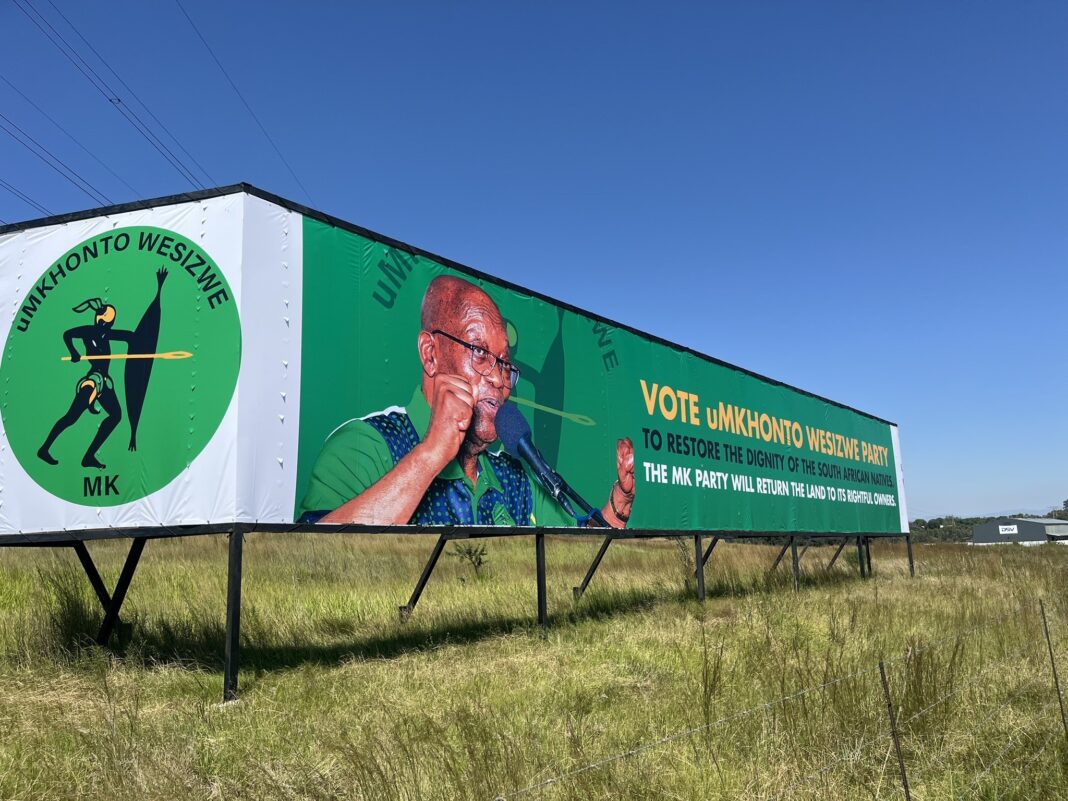Zingisa Mkhuma
In the most dramatic – and unexpected – result to come out of the national and provincial elections thus far, Jacob Zuma’s Umkhonto weSizwe Party has emerged as the largest party in KwaZulu-Natal.
The party also appears poised to replace the Economic Freedom Fighters (EFF) as the third largest party in parliament – another massive win for a party that was registered less than a year ago.
By Friday morning, with 36% of the count in South Africa’s second most populous province, the newest breakaway party from the ANC had taken just over 45.5% of the vote in KwaZulu-Natal.
The ANC had taken 19.6% of the provincial vote – a staggering drop of more than 30% on its 2019 result – while the Inkatha Freedom Party (IFP) had registered 15.6% from the main rural areas counted thus far.
The Democratic Alliance (DA), which had hoped to take control of the province through its coalition with the IFP, had secured 12.9%, leaving them collectively far short of the 50% plus one they needed to win the province.
The Economic Freedom Fighters (EFF) have, like the ANC, fared badly in the count thus far, taking slightly over 2% of votes in a province where it deployed massive resources in the campaign for this week’s poll.
The National Freedom Party (NFP), a breakaway from the IFP which has been in existence since 2011, is unlikely to make it back to the legislature, having taken only 6 000 votes at the time of writing.
The results thus far do not include the eThekwini Metro and other densely populated areas including Pietermaritzburg, where the ANC has historically been strong, but where early indications are that the MK Party has decimated the party in the urban areas as well.
The party has also replaced the ANC as the second largest party in a number of suburban voting districts in which the DA was the largest party.
For example, in all eight voting districts in eThekwini ward 33, where the DA won, the MK Party had replaced the ANC in the number two spot.
The early numbers have shaken the ANC in KwaZulu-Natal – one of its best performing provinces in 2019 – to its foundations and its provincial leaders have been absent from the Results Operations Centre (ROC) since voting day.
They are expected to address the media on Friday, after 50% of the votes have been counted, with the party’s national leadership expected to do the same at the national ROC in Pretoria.
The governing party deployed its entire National Executive Committee (NEC), its top seven leaders and former president Thabo Mbeki to the province ahead of the elections in a bid to hold off the challenge from the MK Party.
The strategy appears to have failed.
The shock result in KwaZulu-Natal means that the ANC’s 44 seat dominance in the 80-seat legislature is over for the first time since it won the province from the IFP in 2004.
At this point there is no clear winner in KwaZulu-Natal – although the provincial MK Party leadership believes they will eventually reach 50% – and the political parties in the province will have to formulate a coalition agreement going forward.
Kwazi Mbanjwa, the MK Party head of mobilisation in the province, said they remained “very confident” that they would get more than 50%, but that they would seek coalition partners should they need to do so.
The party would decide on its premier candidate and who occupies the projected 37 legislature seats it has taken off the ANC by Monday.
Apart from the emergence of Zuma as the head of the MK Party, other factors that have impacted on the ANC’s popularity with voters in the province including the increasing tensions between the provincial government and king MisuZulu ka Zwelithini over a number of issues.
Days before the elections, the king called a meeting of all the province’s traditional leaders to mobilise them against the ANC government’s handling of the Ingonyama Trust, which controls almost 3 million hectares of land in the province on his behalf.
While both the DA and the IFP had committed to their pre-election coalition as part of the Multi Party Charter for South Africa, leaders of the two parties have indicated that they could enter a coalition with the ANC should the electoral figures dictate this.
INSIDE POLITICS

